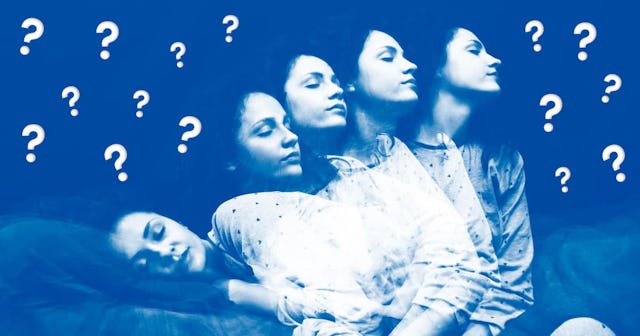Sleepwalking Led Me To Eat Cereal Naked On My Front Porch

It’s 4 a.m. The entire house is asleep, but I’m now awake and not where I once was when I cozied myself up into bed. I’m slumped over on the couch, sticky from eating two popsicles and letting the third one melt on my lap. I’m topless and braless. The TV is on, and playing something random that I’d never normally choose in my conscious state of being. But worst of all? I have no memory of how I got here. All I know is that I was definitely sleepwalking… again.
When I was a child, it happened quite often. My mom would lay me down for bed, turn on her adult shows in the living room, only to see me wandering about the house like a walking vegetable later in the night. Sometimes, I’d fidget with the front door or open the refrigerator, she says. Other times, I’d just stand still. And when it was the most creepy, I’d pace rooms of the house with a blank, “lights-out” type of stare and mumble incoherent words.
The way she remembers it, she was always able to get me back into bed without waking me. She would usually just tell me to go to bed, and I would do it. I wouldn’t always go to bed right away, but with some guidance, I would after being gently reminded.
Some folks believe sleepwalking only happens with children, but that’s just not true. It is most common among adolescents, and it’s something that kids typically outgrow after puberty. But as it turns out, up to 25% of children who had recurring sleepwalking episodes will go on to sleepwalk as an adult — making up more than 8.4 million U.S. adults wandering the halls at night.
As an adult who has been sleepwalking for as long as I can remember, I’ve been able to track my episodes and conclude that their likeliness is usually in sync with great stressors in my life. But there are many reasons for sleepwalking disorders such as, sleep deprivation, sleep disorders, alcohol-abuse, medication side-effects, heart problems, and psychiatric disorders including PTSD, panic attacks and multiple personality disorder.
It’s unclear why some adults continue to sleepwalk while others don’t, as it’s been given little research and medical attention. But according to a new published study, sleepwalking can become dangerous, inappropriate, and even reduce the overall quality of one’s life.
Artfoliophoto/Getty
“We found a higher frequency of daytime sleepiness, fatigue, insomnia, depressive and anxiety symptoms and altered quality of life in patients with sleepwalking compared to the control group,” lead author and investigator on the study, Yves Dauvilliers, MD, PhD, tells AASM. “What would usually be considered a benign condition, adult sleepwalking is a potentially serious condition and the consequences should not be ignored.”
Just within the past few years, I’ve woken up outside on numerous occasions: My rump seated on the cold cement of our back porch stairs, and my neck pained from nodding it against the side of our home or edgings of our doorway. One time, I even walked outside, sat on our front porch swing with a bowl of cereal, and ate Fruit Loops completely butt-ass naked. Thankfully, my dream-state had enough common sense to wrap me in a fuzzy blanket before making my “birthday suit” debut near a busy street.
I’ve been known to masturbate and initiate sex with my partner while I’m fully asleep. I’ve written complete gibberish in the notes of my phone while I’m snoozing. And I have even taken baths (the most common of my sleepwalking occurrences), which usually wake me once the water is freezing cold and, occasionally, overflowing the sides of the tub.
Dan Baker/Reshot
Clearly, this is not anyone’s definition of a good night’s rest.
Whenever this happens and I start to come to, I’m so damn confused. Almost delusional for a minute or two. I think snippets of fast-occurring thoughts like:
“What am I doing?”
“Why am I here?”
“What is going on?”
During a sleepwalking episode, the brain is still partly awake, which results in “complex behaviors” of the sleepwalker without consciousness of actions. And let me be the first to tell you, there is a reason people are told to never wake a sleepwalker abruptly.
Considering a good chunk of my sleepwalking tendencies are categorized as “potentially dangerous” due to the situations I wake up in, it’s not unusual for me to experience feelings of terror upon waking. And if I’ve been awoken quickly, be it bumping into a counter, harshly falling after I’ve stumbled, or someone waking me up harshly, I feel even more scared and confused than usual until I’m able to piece it all together.
Dauvilliers classifies sleepwalking as a serious, “underdiagnosed” condition, one that “needs to be highlighted and emphasized.” Not just that, but it needs to be de-stigmatized, as it is totally and completely beyond the sleepwalker’s control.
This article was originally published on